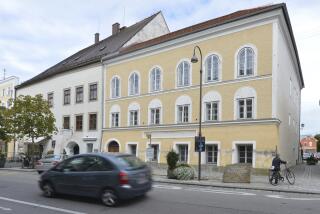Cabinet Meets in Berlin as a Prod to Move
- Share via
BERLIN — German Chancellor Gerhard Schroeder on Tuesday convened the first Cabinet meeting here since Adolf Hitler was in power--in a symbolic show of impatience over the stalled move of the capital from Bonn, where the new leader works in the shadow of Helmut Kohl.
Schroeder, who succeeded Kohl only four weeks ago, has repeatedly pushed the army of builders and planners at work refitting this city to speed up construction of the new government quarters along the Spree River.
The 54-year-old chancellor is Germany’s first leader with no personal memories of World War II and the Nazi horrors, and he has made it clear he wants to govern a reunified state that has moved beyond a “postwar era” to a time defined by prosperity and peace.
But Schroeder’s eagerness to put his stamp on the country has already undercut his assurances to Western allies that the new leftist leadership will maintain continuity in its relations with other countries.
Although the entire Cabinet traveled to Berlin for Tuesday’s meeting, it couldn’t escape mounting criticism in Bonn and Washington over Foreign Minister Joschka Fischer’s suggestion that the North Atlantic Treaty Organization renounce its claimed right to “first-strike” use of nuclear weapons. That deterrence policy developed in the Cold War stare-down with the Soviet Union has long been a cornerstone of alliance security strategy.
“He’s let the cat out of the bag,” said Angelika Merkel, a leading member of Kohl’s Christian Democratic Union, suggesting that Greens party member Fischer was showing his true colors. Fischer was among the most vocal and active protesters against NATO nuclear missile deployments in Germany in the 1970s but has joined Schroeder in declaring the new government’s support for NATO.
Even Defense Minister Rudolf Scharping, a Social Democrat like Schroeder, seemed to distance himself from Fischer’s remarks in this week’s Der Spiegel magazine. Scharping, on a visit to Washington, told German journalists that he believes the ruffled feathers of U.S. security gurus were smoothed by his assurances that Germany has no intention of pushing for fundamental changes in NATO strategy.
The flurry of criticism and clarification dampened the mood at the Cabinet meeting in a former East German Communist Party building in central Berlin--a roadshow intended to confirm that the government will be working from here next year whether the facilities are ready or not.
The newly revamped Reichstag will once again house the Parliament next spring, but Schroeder’s nearby chancellery is at least four months behind schedule and will be ready in October 2000 at the earliest. That means the chancellor will have to work out of the charmless Communist Party building for at least a year.
Schroeder said shortly after his Sept. 27 election that he wants to see the Berlin move accelerated, but the news since then has mostly been about delays and complications.
At least 11,000 of Bonn’s 26,000 federal government workers will be relocated to Berlin next summer in the first major wave of a move expected to cost $12 billion.
On the good-news front, German President Roman Herzog’s offices moved into new Berlin quarters over the weekend.
But Schroeder, who has been shuttling between Bonn and his home in Hanover while Kohl continues to occupy the official Bonn residence, appears destined to live out of suitcases for the first half of his four-year term.
More to Read
Sign up for Essential California
The most important California stories and recommendations in your inbox every morning.
You may occasionally receive promotional content from the Los Angeles Times.














